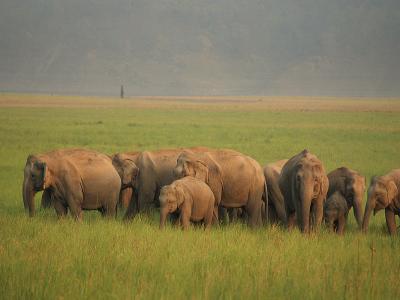
Utterly frustrated at their standing crops being destroyed year after year by the pachyderms, the residents of the villages in the peripheries of the Rajaji Sanctuary and Corbett National Park have been approaching the state forest department and the wildlife authorities, to provide them some safety from the marauding elephants, but to no avail.
The forest department did dig up trenches in the hope that they would help in preventing the pachyderms from crossing into the agricultural fields in the villages, but it has not worked. There after wire fencing with mild electricity current, in phases, was adopted, but that too has not been of much help.
Not knowing what to do, as the elephants continue to make the crops in the fields their staple food, the state forest department has asked the villagers to take up to cultivation of chilies, which could become their cash crop. The department has also told the villagers that they will be given some subsidy for getting the chilly plants for cultivation.
However, the farmers at their wits end. For one, they have never done cultivation of chilies on such a large scale and two, they are not sure where and how to market the chilies. The forest department has, however, assured them to look into the marketing aspect and asked the villagers to take up the cultivation of chilies on 100 hectares of land on trial basis.
An official of the forest department, on conditions of anonymity said that the man-pachyderm conflict in the region was only set to grow worse as elephant herds not finding fodder in the forests were turning to the fields in search of food. As villagers try to protect their crops, they get violent on the pachyderms, which also then resort to violence, causing damage to houses.
He said that a full grown elephant on an average requires about 150 kg of fodder every day and the small forest pockets in which the herds are now confined cannot sustain the numbers forcing them to the fields. There are about 1250 to 1350 elephants in the Rajaji Sanctuary and Corbett National Park and adjoining forest divisions, down from the about 1600, about a decade back.
The official said that earlier the elephant herds moved from the forests in Kumaon to Paonta Sahib in Himachal Pradesh, which gave the forests to rejuvenate as the herds took to their migration. “But now they are confined to small pockets and cannot migrate as the corridors used for migration have been usurped by man.
“The development plans made in the past, whether for laying roads, irrigation canals or even railway tracks, did not care a fig for the migration corridors of the wild animals, as they were considered the least important, because of which almost all the corridors of migration have been taken over by man forcing the elephants to live in small pockets of forests which cannot sustain them”, he added.
He said that unless there is an emergent plant taken up to create the corridors by recreating green infrastructure along the old destroyed corridors, the migration of elephant herds will not restart and if they continue to remain ins such small pockets and plundering agricultural fields for food, they will be killed randomly by the villagers. “We have lost our tigers, we stand to lose our elephants”, he felt.
A journalist with over 40 years of experience, Jagdish Bhatt was Editor, Hill Post (Uttarakhand).
Jagdish had worked with India’s leading English dailies, which include Times of India, Indian Express, Pioneer and several other reputed publications. A highly acclaimed journalist, he was a recipient of many awards
Jagdish Bhatt, aged 72, breathed his last on 28th August 2021 at his Dehradun residence.




